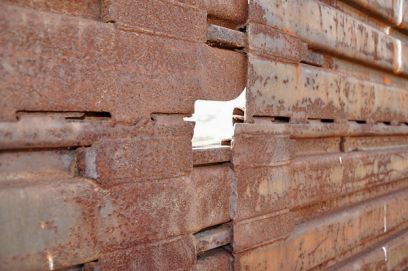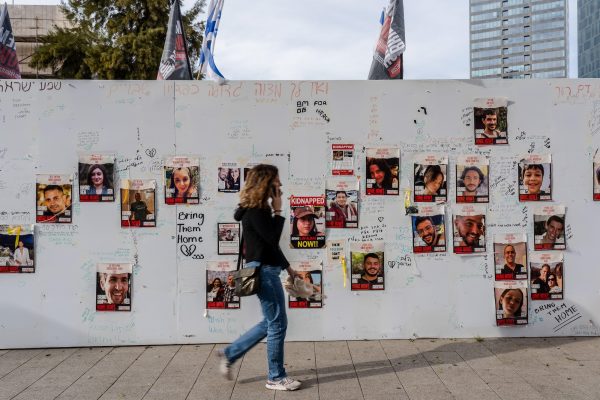The recent twenty-fifth anniversary of the fall of the Berlin Wall should have been a moment not only of celebration but also of despair. Germany’s was hardly the last fortified border. New lines and border outposts in India, Spain, and Iraq, neighbors separated in Tijuana, Rio, and Baghdad, speak to violence past and future. Although the United States once hastened the fall in Berlin, since 1989 it “has emerged as a champion wall builder.”
Today’s walls are many and ineffective. The walls and fences separating Israel from Gaza and the West Bank arguably have stemmed the flow of Palestinian militants to Israel but have done nothing to prevent outbursts of Israeli war-making. We have also witnessed a record-breaking number of people trying to enter the European Union illegally—often at the cost of their lives. Yet barriers remain attractive to policymakers. Ukraine, though near default, plans to build a €100 million wall to defend itself from Russia. Some American politicians, ludicrously, believe the U.S.-Mexico border must be strengthened in light of supposed security threats from Ebola, ISIS, and even Ukrainian dissidents.
As the historian Wendy Pullan puts it, “We don’t have examples of walls solving problems.” This failure should be conceived in relation to the alienation, prejudice, and violence that seem to be inherent in the fortification of border walls. We must turn our attention to those in power who construct these walls. And we should recognize what the walls do to those inside. To quote the urban theorist Michael Dear, writing on the U.S.-Mexico border, we should seek a point where “America’s national identity is again defined by something more durable than a strip of steel.”
It may seem like an overstatement to assert that the identity of a nation lies in its borders. But there are instructive parallels between fortified borders and the tendencies of those nations that build them.
Consider a material irony. There is, on the one hand, the sturdiness of steel and, on the other, its flimsiness as a policy, the stoutness of concrete and its pointlessness in resolving problems. An irony of the same shape is visible in other policies. Mass incarceration: attempts to reduce crime in the United States through inflated charging and sentencing lead to overcrowded prisons, which must then disgorge inmates. Strengthened security measures since 9/11 do not stanch the politics of insecurity, as evidenced by the ebola and ISIS nonsense. Restrictive European immigration policies that ought to salve nativist tendencies seem to produce more racism. And the Israeli policy of disproportionate use of force gives rise over and over to more bloodshed.
In light of the failures of ostensibly strong and durable measures, we find a tendency to continuously strengthen these same measures, whether they are laws, borders, or walls. Confronted with these problems of security, imaginary or real, fortified borders and restrictive policies perpetuate the flawed logic that created them. They signify a fundamental logic of fear that responds to every challenge with a call for ever more defensive measures.
Yet this is not the heart of the problem. Political, ideological, and economic interests support this logic, which makes it more than a reaction based on fear. It is really a matter of power. Emblematic in this case are the neoliberal austerity measures aimed at solving the crisis brought about by neoliberal economic policies. This is not limited to the West. On the contrary, it is only in light of the present crisis that the West has imposed on itself measures it has long demanded beyond its own borders. Whether we are winners or losers in the present capitalist society, we are always defined by this logic of power, which places alternatives beyond imagination. As Slavoj Žižek notes, it is easier to imagine climate disaster than to imagine changing the politics that cause it. The greatest emergency is that we are no longer capable of questioning the capitalist framework or, to paraphrase Martin Heidegger in Contributions to Philosophy (1936), the greatest emergency is the lack of emergency, a situation in which “self-certainty has become unsurpassable, where everything is held to be calculable, and especially where it has been decided, with no previous questioning, who we are and what we are supposed to do.”
The fortified border of steel defining the identity of the American nation is a product of a broader and even more fortified limit that defines the identity of the capitalist West. This is perhaps why so many Americans oppose President Obama’s restoration of diplomatic relations between the United States and Cuba, despite the failure of more than fifty years of continuous fortification. This announcement is not simply interpreted as a defeat of American boundaries (bearing in mind the exchange of spies this announcement included) but also of American identity, superiority, and exceptionality. Any effort to redefine rigid borders is met with outrage.
Yet, despite this outrage and fear, it is unlikely that the redefinition of the border with Cuba will challenge the “unsurpassable self-certainty” of the neoliberal paradigm. With Belén Fernández, we might argue that the recent change in the U.S.-Cuba relations is but one more effort to fortify this paradigm.
Indeed, walls that are supposed to end emergencies not only heighten our fears—of viruses, terrorists, dissidents, foreigners—but also limit our capacity to change the status quo, which has only hardened since the fall of the Berlin Wall twenty-five years ago.







